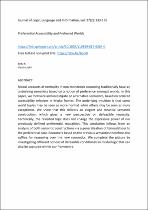JavaScript is disabled for your browser. Some features of this site may not work without it.
- ResearchSpace
- →
- Research Publications/Outputs
- →
- Journal Articles
- →
- View Item
| dc.contributor.author |
Britz, K

|
|
| dc.contributor.author |
Varzinczak, I

|
|
| dc.date.accessioned | 2019-03-08T08:36:47Z | |
| dc.date.available | 2019-03-08T08:36:47Z | |
| dc.date.issued | 2018-06 | |
| dc.identifier.citation | Britz, K. and Varzinczak, I. 2018. Preferential accessibility and preferred worlds. Journal of Logic, Language and Information, vol. 27(2): 133-155 | en_US |
| dc.identifier.issn | 0925-8531 | |
| dc.identifier.issn | 1572-9583 | |
| dc.identifier.uri | https://link.springer.com/article/10.1007/s10849-017-9264-0 | |
| dc.identifier.uri | https://doi.org/10.1007/s10849-017-9264-0 | |
| dc.identifier.uri | https://rdcu.be/bpFi0 | |
| dc.identifier.uri | http://hdl.handle.net/10204/10767 | |
| dc.description | Copyright: 2018 Springer. Due to copyright restrictions, the attached PDF file only contains the abstract of the full text item. For access to the full text item, please consult the publisher's website: https://doi.org/10.1007/s10849-017-9264-0. A free fulltext non-print version of the article can be viewed at https://rdcu.be/bpFi0 | en_US |
| dc.description.abstract | Modal accounts of normality in non-monotonic reasoning traditionally have an underlying semantics based on a notion of preference amongst worlds. In this paper, we motivate and investigate an alternative semantics, based on ordered accessibility relations in Kripke frames. The underlying intuition is that some world tuples may be seen as more normal, while others may be seen as more exceptional. We show that this delivers an elegant and intuitive semantic construction, which gives a new perspective on defeasible necessity. Technically, the revisited logic does not change the expressive power of our previously defined preferential modalities. This conclusion follows from an analysis of both semantic constructions via a generalisation of bisimulations to the preferential case. Reasoners based on the previous semantics therefore also suffice for reasoning over the new semantics. We complete the picture by investigating different notions of defeasible conditionals in modal logic that can also be captured within our framework. | en_US |
| dc.language.iso | en | en_US |
| dc.publisher | Springer | en_US |
| dc.relation.ispartofseries | Worklist;22097 | |
| dc.subject | Modal logic | en_US |
| dc.subject | Non-monotonic reasoning | en_US |
| dc.subject | Preferential semantics | en_US |
| dc.title | Preferential accessibility and preferred worlds | en_US |
| dc.type | Article | en_US |
| dc.identifier.apacitation | Britz, K., & Varzinczak, I. (2018). Preferential accessibility and preferred worlds. http://hdl.handle.net/10204/10767 | en_ZA |
| dc.identifier.chicagocitation | Britz, K, and I Varzinczak "Preferential accessibility and preferred worlds." (2018) http://hdl.handle.net/10204/10767 | en_ZA |
| dc.identifier.vancouvercitation | Britz K, Varzinczak I. Preferential accessibility and preferred worlds. 2018; http://hdl.handle.net/10204/10767. | en_ZA |
| dc.identifier.ris | TY - Article AU - Britz, K AU - Varzinczak, I AB - Modal accounts of normality in non-monotonic reasoning traditionally have an underlying semantics based on a notion of preference amongst worlds. In this paper, we motivate and investigate an alternative semantics, based on ordered accessibility relations in Kripke frames. The underlying intuition is that some world tuples may be seen as more normal, while others may be seen as more exceptional. We show that this delivers an elegant and intuitive semantic construction, which gives a new perspective on defeasible necessity. Technically, the revisited logic does not change the expressive power of our previously defined preferential modalities. This conclusion follows from an analysis of both semantic constructions via a generalisation of bisimulations to the preferential case. Reasoners based on the previous semantics therefore also suffice for reasoning over the new semantics. We complete the picture by investigating different notions of defeasible conditionals in modal logic that can also be captured within our framework. DA - 2018-06 DB - ResearchSpace DP - CSIR KW - Modal logic KW - Non-monotonic reasoning KW - Preferential semantics LK - https://researchspace.csir.co.za PY - 2018 SM - 0925-8531 SM - 1572-9583 T1 - Preferential accessibility and preferred worlds TI - Preferential accessibility and preferred worlds UR - http://hdl.handle.net/10204/10767 ER - | en_ZA |






